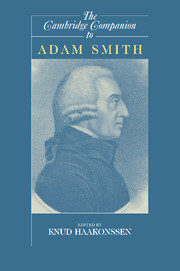Book contents
- Frontmatter
- Introduction: The Coherence of Smith’s Thought
- 1 Imagination: Morals, Science, and Arts
- 2 Adam Smith, Belletrist
- 3 Adam Smith’s Theory of Language
- 4 Smith and Science
- 5 Smith on Ingenuity, Pleasure, and the Imitative Arts
- 6 Sympathy and the Impartial Spectator
- 7 Virtues, Utility, and Rules
- 8 Adam Smith on Justice, Rights, and Law
- 9 Self-Interest and Other Interests
- 10 Adam Smith and History
- 11 Adam Smith’s Politics
- 12 Adam Smith’s Economics
- 13 The Legacy of Adam Smith
- Bibliography
- Index
7 - Virtues, Utility, and Rules
Published online by Cambridge University Press: 28 August 2006
- Frontmatter
- Introduction: The Coherence of Smith’s Thought
- 1 Imagination: Morals, Science, and Arts
- 2 Adam Smith, Belletrist
- 3 Adam Smith’s Theory of Language
- 4 Smith and Science
- 5 Smith on Ingenuity, Pleasure, and the Imitative Arts
- 6 Sympathy and the Impartial Spectator
- 7 Virtues, Utility, and Rules
- 8 Adam Smith on Justice, Rights, and Law
- 9 Self-Interest and Other Interests
- 10 Adam Smith and History
- 11 Adam Smith’s Politics
- 12 Adam Smith’s Economics
- 13 The Legacy of Adam Smith
- Bibliography
- Index
Summary
The Theory of Moral Sentiments was a great success upon publication; now it is obscure. An analysis of Smith’s arguments against utility and his position on rules, duty, and virtue may explain why. I begin with a sketch of Smith’s basic theory.
THE BASIC THEORY
Alexander the Great “put Calisthenes to death in torture, for having refused to adore him in the Persian manner” (VI.iii.32). According to Smith, I judge Alexander in two ways. First, I imagine what I would feel if I were in Alexander's place and was presented with Calisthenes's refusal. This act of imagination does not produce in me the affront Alexander feels, and when I do not react to the refusal as Alexander does, I judge Alexander to lack “propriety.” Secondly, I imagine what I would feel were I in Calisthenes's place. I would feel resentment, and do so now, irrespective of what Calisthenes actually feels (II.i.2.4, II.i.3.1, II.i.5.11). If I have found that Alexander lacks propriety, I now judge him guilty of “demerit” and deserving punishment.
- Type
- Chapter
- Information
- The Cambridge Companion to Adam Smith , pp. 189 - 213Publisher: Cambridge University PressPrint publication year: 2006
- 8
- Cited by



